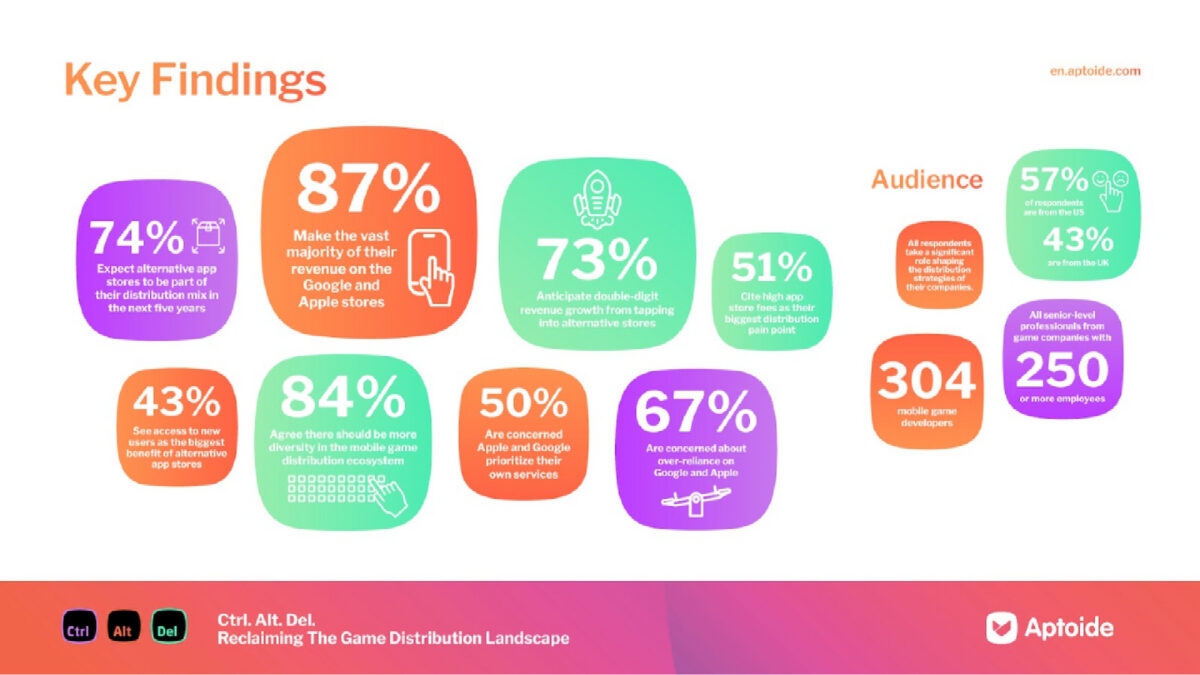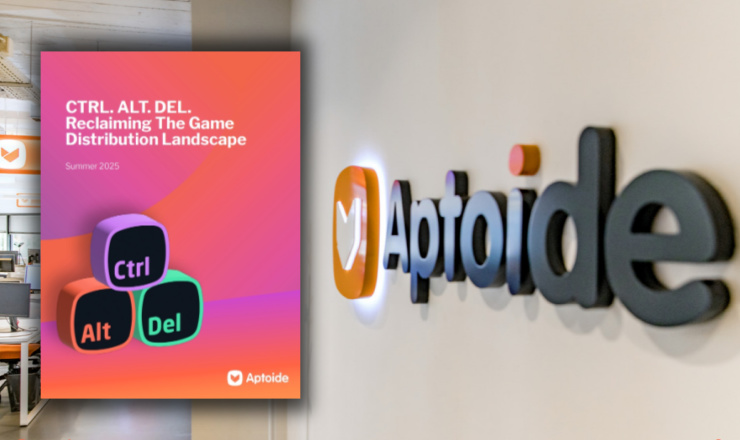A new survey has revealed overwhelming support to end Google and Apple’s dominance over mobile game distribution.
Over 300 senior game development professionals in the UK and the US responded to research commissioned by independent app store, Aptoide, with 84% agreeing that there needs to be a wider choice for distributing mobile games, over and above the market stranglehold presently enjoyed by the App Store and Google Play.
It has been a subject for debate among games developers for several years and in October 2024 Google was ordered to open the Play Store to third-party app stores after Epic Games won a four-year antitrust battle with the tech giant.
The new survey was conducted by Atomik Research and formed the basis for the report issued today (October 7), titled ‘CTRL. ALT. DEL. Reclaiming The Game Distribution Landscape‘.
Results showed 87% of those companies surveyed make the vast majority of their revenue on Google Play and the App Store, with 67% of them expressing concern about over-reliance on the two almost exclusive outlets.
Exorbitant app store fees and marketing costs were the biggest pain point for 51% of respondents, while growing unrest was further underlined by 50% saying they felt Apple and Google prioritized their own services.

The Case For Independent Mobile Game Distributors
It is naturally in Aptoide’s best interests to highlight the advantages of utilising an alternative app store, but seeking the opinions of 304 senior figures within the industry has provided the firm with some compelling ammunition.
There was certainly support for the idea, with 74% expecting alternative app stores to be part of their distribution mix within the next five years and 73% anticipating double-digit revenue growth from tapping into alternative stores.
Aptoide’s report argues that platforms can unlock continued growth for titles that have plateaued on Google Play or the App Store, with revitalised exposure and access to new users.
Where Alt Stores Can Provide Big Wins
Without naming names, it cites a case study from its own records, revealing that a “major mobile game publisher” had turned to Aptoide after revenues were levelling out on Google Play.
Over a two-year period, Aptoide drove over $76 million in gross revenue to the developer with more than two million downloads, showing how even titles that have already been successful can find further considerable gains with an alt store strategy.
It also stresses the benefits for smaller teams and newer games as alternative stores provide a level playing field and also gave examples of launching game son the same day that they were released by one of the traditional stores.

The JoyNet Games titles Fist Out, Monmate Master, Legend of Mushroom, Zombie.io, and Samkok: New Force all benefitted from a multi-channel distribution strategy from day one.
A spokesperson for JoyNet Games said: “The shift towards alternative distribution is no longer theoretical.
“Alternative distribution channels help us reach a broader audience, reduce dependency on a single platform, and provide more flexible marketing strategies.
“They also allow for cost optimization and improved profitability.”
Executive Summary
In his executive summary, Paulo Trezentos, the CEO and co-founder of Aptoide, emphasised the growing need for change.
“The mobile game ecosystem is overdue for a reset,” he said.
“For too long, Google’s Play Store and Apple’s App Store have operated as an entrenched duopoly – setting too many rules, taking too much revenue, and limiting flexibility for the developers and publishers powering the industry.
“Commercial and creative potential have become increasingly stifled.
“But the tide is turning.
“A new wave of opportunity is emerging through alternative app stores – platforms that offer game makers greater control, better economics, and access to untapped audiences.”
Key Findings from CTRL. ALT. DEL.
- The Duopoly: 87% of senior developers say the vast majority of their revenue still comes from Google and Apple stores.
- Industry Dissatisfaction: This means 67% fear the risks of their reliance on Google and Apple, and 84% demand a more diverse ecosystem;
- Developer Pain Points: 51% cite punishing fees as their top frustration, followed by spiraling acquisition and marketing costs (46%), inflexible policies (44%) and persistent discoverability struggles (43%).
- Walled Gardens: 50% are concerned Apple and Google prioritize their own services.
- The Alt-Store Opportunity: 73% expect double-digit revenue growth from publishing to alternative stores.
- Perceived Benefits: Access to new users (43%) and greater freedom from restrictive policies (42.4%) are seen as the top advantages.
- Future Outlook: 74% believe alternative app stores will be a core part of their distribution mix within five years, rising to 86% in the US.






